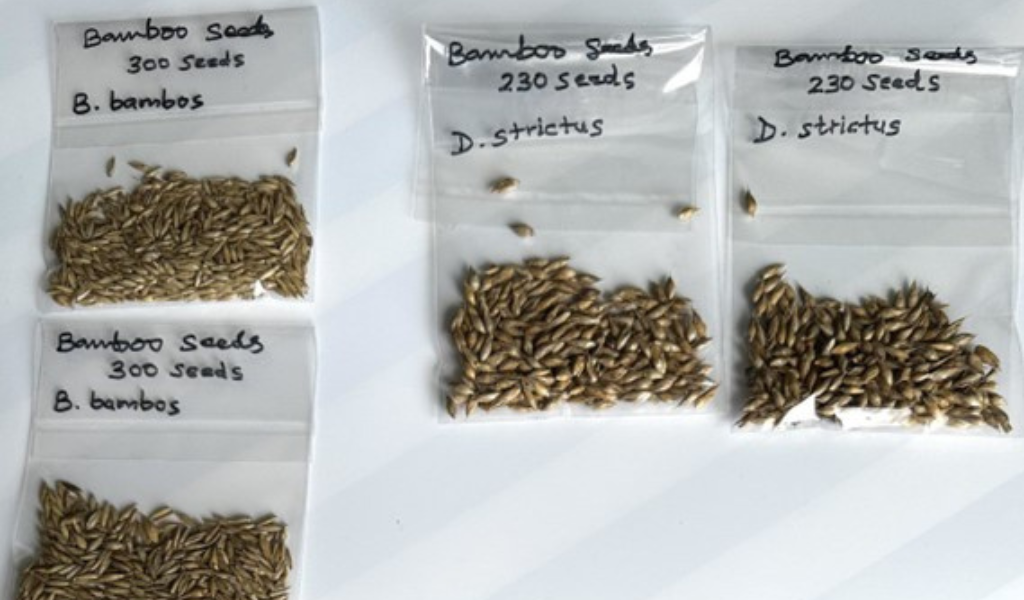
Atmosphere Core In Collaboration With The Gov’t of Maldives Launches ‘Bamboo for Climate Mitigation Project’
Atmosphere Foundation has collaborated with the Ministry of Environment, Climate Change and Technology (MoECCT) and the Ministry of Fisheries, Marine Resources and Agriculture (MoFMRA)to launch the ‘Bamboo for Climate Mitigation’ Project in the Maldives. Led by the Vice President of the Atmosphere Foundation, the project will see the planting of bamboo seedlings on a mass scale across the Maldives and the germination and propagation of seeds to sustain the project and for research.
During the initial phase of this project, 500 bamboo seedlings will arrive in the Maldives at the end of May. These seedlings will then be equally distributed between community islands and industrial islands under the care of MoECCT and MoFMRA. This collaboration between Atmosphere Foundation and the MoECCT has been formalized through the signing of a Memorandum of Understanding (MoU).
For this project, generous donations of bamboo seeds were facilitated by private individuals, which forms a huge component of the project’s sustainability. Two seed varieties were received through donations including the Bambusa bambos and Dendrocalamus strictus (Dendrocalamus is a tropical Asian genus of giant clumping bamboo in the grass family). These seeds conveniently germinate in 12 days though the standard time for germination of bamboo seeds is between 30-40 days.
Seeds have been distributed to stakeholders and those who express interest in planting bamboo, including community islands and NGOs, individuals, commercial agriculture islands and Hanimaadho Agriculture Center under MoFMRA. In addition, resorts of Atmosphere Core Pvt Ltd will each receive the two varieties of bamboo seeds for germinating and incorporating into their landscaping programs. This project is expected to make a significant contribution to the country's carbon neutrality goal – which aims to become carbon neutral by 2030.
In line with the Foundation’s core values to conduct programs that benefit communities, a seminar titled ‘Working Towards Neutral Maldives with Bamboo’ will be hosted. This event will strive to raise awareness about the effective adaptive and mitigative measures for Maldives to achieve its target of becoming a net zero carbon emitter by 2030. This part of the project will be led by Dr Nambi Barathi – an influential figure in the world of Bamboo in India.
Dr Barathi is the Founder Director of Growmore Biotech Ltd and for the past 20 years, he has been researching bamboo. The result was the development of a superior clone of the Bambusa balcooa, a fast-growing higher biomass-yielding bamboo developed by the conventional breeding method, known as Beema bamboo. Beema bamboo yields 40 tons of dry bamboo from 1 acre (0.4ha) which captures over 88 tons of carbon dioxide every year and releases over 60 tons of oxygen. This clone is thornless and sterile and was developed through tissue culture and free from pests and disease. The bamboo is said to thrive for hundreds of years without needing replanting. This species is considered one of the fastest-growing plants. It grows as much as 1.5ft per day under tropical conditions. It is said to be the best ‘carbon sink’ to mitigate carbon dioxide emissions.
Bamboo is regarded as the future crop of the world, assisting in climate change mitigation, providing renewable energy, raw materials, and becoming a highly profitable commodity in agriculture. Bamboo is known to have high carbon sequestration rates and releases 35% more oxygen than other plants. Moreover, it enhances soil quality and fosters a healthier environment, making it an ideal plant for the Maldives where it was noted that there are now 36 inhabited islands in the Maldives with less than 30% green cover.
The general understanding is that the carbon absorption rate, of living bamboo as well as long-lived bamboo products, is extremely high. Additionally, Bamboo has surprisingly high economic value and its known and potential uses include thermal application, liquid fuel for vehicles, wood for timber requirements, cotton for textiles, and in construction. Its high tensile strength, stronger than steel, makes it an ideal material for building and construction. Design and art and crafts made of bamboo are also quite abundant in the consumer market.